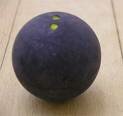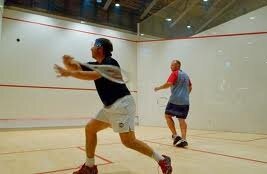
Squash Tips
Coach

| Home Page |
| Contact |
| Availability |
| Locations |
| GSK Stevenage |
| Training Camps |
| Squash Tips |
| Links |
| Rackets |
| Rules |
|
...more Squash Tips click HERE
Need some help with your swing? Looking for some tips to help you get one over your mates on court? Cocked Wrist |

|
This is a debate that runs through the squash coaching community and opinions vary generally depending on your country of origin. My feeling is that when you have plenty of time and are in a stable position, then have a slightly cocked wrist is absolutely fine and produces a solid strike on the ball – on impact the wrist will break to allow the racket head to come through. However, in a situation where you are under pressure, having the wrist in a neutral non cocked) position and therefore allowing the racket head to be further away from the body allows for much more control of the racket head. Personal preference has to come into this discussion but I'd very much discourage a "very" cocked wrist as it offers too much scope for error on impact, especially under pressure.
Read Derek's advice
Westerners should keep the wrist cocked. The "snap" of the wrist is really the forearm pronating, or turning over. When in trouble/under pressure use the wrist. If you do it all the time, you may get tennis elbow or a sore wrist.
Injury Free Training
How can you train without over-training and avoid injury? We all want to be reasonably fit to play. At important events we want to reach peak fitness, to reach our full potential. That could be playing a friend, box league, club championship, county, national...etc.
Read Derek's advice
Make a yearly plan. Focus on the really BIG events for you. League, club, county or national champs. Set a few ambitious personal goals. What do you need to do to achieve your best, given the available time?
Most squash players play all year round. Some take a summer break and play other sports. At a quiet time of the year, say July-August-September do off-season training.
Non-impact Training
is possible. Racehorses and dogs use swimming pools to train in. Nicol David recently won the Ladies World Championships for the 6th consecutive year. These are her comments
"Pool training has played a big part in my training when I was growing up. I didn't do weights when I was a junior because my body wasn't ready to take on the heavy weights while trying to stay away from injuries. That's why I used to do resistance workouts in the pool and running drills/sprints as well.
Nowadays I just swim during my off season training time while I'm at home in Malaysia. I still think it's a great form of training for squash. 2-3 weeks before a tournament it's best to do speed work on court because the pool work could make your legs feel heavy closing into tournaments."
- Swim
- Walk
- Play another sport! Choose wisely
- Learn about nutrition
- Rest
- Practice yoga
- Warm-up & stretch before and after vigorous exercise
- Read about sport and competition
Injuries
Unfortunately we all get them. Don't train when injured. Get professional medical advice and talk to your coach or physio for useful tips.
Month-1 Run
UNINJURED PLAYERS Run long distance 2-3 times x per week if you are injury-free. For juniors, seniors or those with concerns consider non-impact training methods. Join a Squash Camp or take a few lessons.
Continue to play regularly.
Month-2 Sprint
UNINJURED PLAYERS Sprint between lamp posts; jog to next one. Repeat 5 times. Increase by 2 each day. Geoff Hunt won the British Open 8 times, beating Jonah Barrington many times. His sprinting consisted of sprinting 440 metres, jogging 440 and by the end of a month he was doing this 30 times in an hour. On court training will consist of court sprints. Build up the number per day over the month.
Continue to play regularly, mixing this with drills and practice exercises on court.
Month-3 Match Practice
UNINJURED PLAYERS Continue to play regularly, playing people better than yourself. This is the time to get match practice. By the end of the month you should be ready to play in that all important Competition.
Good Luck !!
Derek says: Start slow and build up steadily. Avoid injury